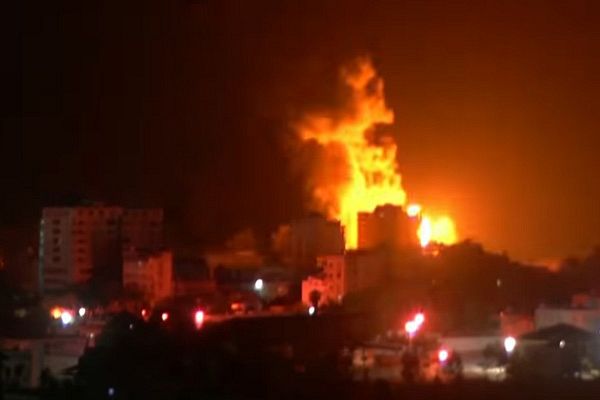Paul Taucher and Dr Dean Aszkielowicz argue that war crimes justice does not work the way commentators generally suggest it does.
AFTER THE SECOND World War, the victorious Allies prosecuted German and Japanese civilian leaders and military personnel for war crimes. The decision to hold these trials was based partly on a belief that the decades prior to the war had seen a genuine awakening among nations that some rules should apply to the conduct of wars and that efforts must be made to avoid devastating conflicts.
The trials were a genuine attempt to not only punish crimes arising from the war, but to set new standards that would police the conduct of belligerents in future conflicts. While the trials did establish some enduring principles, they were silent on the use of some of the most destructive military technologies and tactics that would come to define future conflicts. The costliest of these omissions was the killing of civilians during aerial bombardment — still a common feature of conflicts today. War crimes law, as it stands, seems to do more to provide legal justification for these killings than it does to prevent suffering.
Air power gives a military the ability to kill, destroy and terrify an enemy without having to engage in costly or messy confrontations with ground forces. A large air force has the potential to destroy entire cities. Today, air power tends to target specific areas, assets or people, but the damage modern weapons can cause is massive and even the most sophisticated have a margin of error when it comes to accuracy.
Compounding this issue is that wars these days tend to feature guerrilla, insurgent or militia fighters who are spread throughout civilian areas. Collateral damage is ubiquitous in air warfare. There have been several attempts to formalise rules to cover the use of aerial bombing and to enshrine protections for civilians and their property into international law, but these have either been too vague or failed to receive enough support.
Problems with the law
Most of the world’s major powers have not signed the most important international treaty on the laws of war: the Rome Statute (1998). It is the basis for the International Criminal Court (ICC), which is a body that has the power to prosecute individuals from signatory nations for war crimes. The nations that have not signed tend to be the ones dropping the most bombs and firing the most missiles.
The law on aerial bombardment is weak. The legality of a strike that kills civilians rests on whether the attack was made with proportional force, in pursuit of military objectives. The principle of proportionality requires that military attacks must weigh the military benefit of the attack against the collateral damage caused to civilians. This collateral damage is not limited to direct civilian casualties.
This notionally provides a level of protection for civilians. But what constitutes proportional force is unclear, as is how a court would weigh civilian deaths against military objectives. The result is a law that does not say you cannot strike civilian areas, but rather provides scope for militaries to do so legally. For both signatories to the Rome Statute and those that have not signed, it is a key piece of international law that seems to endorse the view that some civilian deaths in air wars are permissible.
The example of the Israeli strikes on Gaza
Last Saturday, journalists from Al Jazeera, the Associated Press and the BBC were warned by the Israeli Defence Force (IDF) that they were about to attack the building where their offices were in Gaza. An hour later, news outlets streamed dramatic footage of the high-rise building collapsing after it was hit by Israeli missiles. The footage was part of a day of confronting violence, with other reports of civilian deaths from IDF munitions that hit a refugee camp. Many commentators were quick to label the bombings as war crimes.
For this to be the case, the action by the IDF would have to be considered excessive and not in pursuit of military objectives. In the case of the tower, in warning occupants, the IDF is admitting that the death of civilians in the building would not be proportional to the military advantage of destroying it. What follows from this is that the IDF considered the destruction of the building – an important piece of infrastructure in Gaza – as proportional without civilian death.
The IDF has the capacity to destroy the majority of the West Bank and the Gaza Strip overnight. In this light, the destruction of a tower seems like a show of restraint. This is a challenge for war crimes law — it is trying to limit the nearly unlimited destructive power of modern militaries. Any action by an advanced military where it does not unleash its full destructive force can potentially have a veneer of proportionality.
There is also the fact that the IDF was necessarily acting on its own intelligence that the tower was used by hostile forces. Those planning the strike get to decide if the target is legitimate and what level of force is appropriate. This is particularly relevant to the case of the recent deaths of Palestinians in the refugee camp. The IDF claim is that Hamas fighters are hiding among the civilians in the area, who are not being directly targeted by airstrikes.
People will argue over the legality of these strikes and the legitimacy of the IDF campaign overall. But what must be undeniable to all sides is that civilians are dying, their property is being destroyed and it difficult to see how war crimes law is doing much to prevent it from happening.
Problems with politics
Under the current laws of warfare, air raids will probably not result in someone being prosecuted. Partly this is because the law provides weak tests on proportionality and military necessity, but also because countries with powerful air forces do not sign treaties like the Rome Statute. War crimes justice is, therefore, an incomplete project with ineffective laws and too many nations who feel they can ignore it anyway.
But the post-war trials and the ICC are a starting point. Laws that concern war crimes and crimes against humanity – a category of offence that includes prolonged, systemic campaigns of violence and discrimination against a population – can be strengthened. The capacity to investigate and prosecute alleged crimes can be further built. This, in turn, will have an effect on how future conflicts are fought.
To put it another way, if the international community witnesses violence that it senses should not be part of how a war is fought, it needs to go beyond arguing if it is legal and instead make it clear that it is illegal. The 123 nations that have signed the Rome Statute need to reinvest the world’s major powers in international institutions promoting the cause of justice. They need to support the ICC to investigate, prosecute and enforce punishments. They need to emphasise that the law must truly protect civilians rather than only doing so when it is convenient for the military.
Convincing powerful countries to limit the destructive potential of their forces in the field by signing war crimes covenants may seem far-fetched, but the temper of international affairs can change. It was not that long ago that most of the great powers signed an international treaty that renounced aggressive war. As a major supporter of the rules-based international order, a signatory to the Rome Statute and historically a passionate advocate for the need for international war crimes law, Australia has a major role to play.
Paul Taucher is a PhD candidate and casual tutor at Murdoch University with undergraduate degrees in Law and History.
Dr Dean Aszkielowicz is a lecturer at Murdoch University.
Related Articles
- Oscars controversy over allowing countries to hijack Holocaust history
- Give the ADF a chance to do the right thing
- What the Afghanistan report means for the commanders
- War crimes report: Changing the culture and facing the true cost of war
 This work is licensed under a Creative Commons Attribution-NonCommercial-NoDerivs 3.0 Australia License
This work is licensed under a Creative Commons Attribution-NonCommercial-NoDerivs 3.0 Australia License
Support independent journalism Subscribe to IA.















